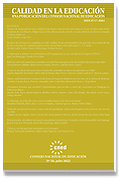Education for Sustainable Development in Early Childhood Education in Chile
DOI:
https://doi.org/10.31619/caledu.n56.1180Keywords:
early childhood, cultural adaptation, sustainable pedagogical practices, education for sustainable developmentAbstract
The study aims to assess sustainable practices in early childhood education. We observed classrooms in institutions with different administrative dependencies, located in the North, Center and South of Chile using the adaptation of the Environmental Rating Scale for Sustainable Development in Early Childhood. The scale was applied to 36 early childhood educators, obtaining 93 records. The results in the dimensions of social, economic, and environmental sustainability were compared according to educational level, administrative dependency, and geographical location of the establishment. The pedagogical practices in the dimensions of social and economic sustainability revealed poor results, close to 2 out of a maximum of 5, finding markedly asymmetric distributions (SAC > 1.96). Additionally, the usability of the scale for remote work contexts was explored, determining some irrelevant items. Likewise, through the analysis of interviews with educators and directors of preschool institutions, the definitions associated with sustainability practices were identified. We found less knowledge on issues such as gender approach, social justice, economic training, although the importance of working on these themes was recognized, accepting that it is in this vital period of childhood when values and social awareness of sustainability can be promoted.
Downloads
Published
Issue
Section
License
Authors retain their Copyright and only transfer a part of these to the journal, accepting the following conditions:
Authors keep their rights as authors and guarantee the right to the journal for the first publication of their work, which is simultaneously subject to the Creative Commons Attribution license allowing third parties to share the study accrediting the author and first publication in this journal.
Authors may adopt other non-exclusive license agreements for distribution of the version of the published work (e.g. inclusion in an institutional thematic file or publication in a monographic volume) accrediting initial publication in this journal.
Authors are allowed and recommended to share their work over the Internet (e.g. in institutional telematic files or their website) before and during the submission process, which may lead to interesting exchanges and increased citation of the published work. (See The effect of open access).

